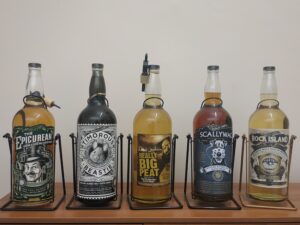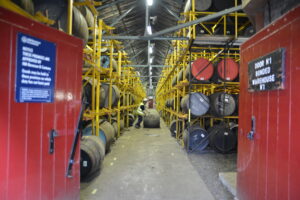Know when it’s time to graduate from whisky bottles to casks.

Simon Aron is the Managing Director of Cask Trade and Auction Your Cask. A passionate whisky collector of 20+ years, Simon is happy to share his journey and insights - from a whisky enthusiast and investor point of view.
I have collected whisky bottles for over 20 years and about 10 years in I started buying casks as well. But nobody really stops buying bottles, they just start collecting casks as well and call it an investment.
3 key considerations when collecting bottles:
SPACE
If you’re like me, you will end up with hundreds or thousands of bottles. You are bound to run out of space at some point and will need to rent space outside of your house. It can be a bit of an inconvenience, which brings me to my next point.
ADMINISTRATION
Keeping track of 100s of bottles, it is important to note the cost price, photograph and catalogue each bottle. It can be a long and arduous job.
RESPONSIBILITY
Whether you are keeping your bottles at home or renting storage space elsewhere, there are a couple of things to keep in mind, such as insurance. There have been several cases when an individual had an entire collection, of thousands of bottles, stolen. You also need to think about protecting the whiskies from sunlight -safe packaging, location and temperature. And then, of course, there’s peer pressure from friends and relatives. “How much can you possibly drink?” Or “When are you going to sell and pay for your kids’ university?” These are questions you will hear quite often. It is useful to decide on your goal with the collection. In other words, what percentage is for investment and what percentage is purely out of interest/passion. For example, making purchases based solely on packaging or because they are limited edition (above 1,5L) simply because I like it. I open about 10% of the whiskies I buy. I want to share them with other people, I bring them along to whisky tastings and dinner parties or I give out small samples as gifts. My dream is to, one day, display my entire collection in a dedicated room, if I can find a room big enough. 
Cask ownership
Compared to bottles, whisky casks are far easier. There’s less administration, no storage issues and you can monitor the maturation and order samples from the comfort of your home. Or you can simply go out and buy one bottle of cask strength whisky, from the same distillery, same finish and similar age, to see what it might taste like. Every cask is unique and different so it won’t be the same, but it will give you an idea.
YOUR OPTIONS ARE:
You either sell your cask investment after having owned it for a while or you bottle it yourself. Unless you have your own label and a way to sell the bottles, I would almost always recommend to sell the entire cask. Either through a private deal, by selling to a company such as Cask Trade or through an auction. When you end up with several hundred bottles of the same whisky, you are unlikely to drink them all. As for giving them away, nobody has that many friends.
I first came across whisky casks in 2010 on the recommendation of a friend of a friend and bought my own cask. Back then, the only cask owners were people in the business and today, there are 50 times more independent bottles on the market. It is amazing how much and how quickly the market has matured in only 10 years.

IT WASN’T STRAIGHT FORWARD
I ran into several obstacles in the beginning. I’ve bought a cask that never existed and a Madeira cask that turned out to be just a regular hogshead. I’ve had casks in the wrong locations (warehouses), bought from unlicensed sellers who falsified ownership documents and was given totally inaccurate measures of Litres of alcohol and strength.
It took me 12 months to verify, re-gauge (health check) and move all of my casks. The only reason it only took 12 months was because I got into contact with Lee Tomlinson who knew exactly who to call, where to go and how to deal with the situation. He is now one of my co-directors.
SILVER LINING
Every cask is unique in its own way. As of today, there is no official index or quoted market prices. As an alternative asset, it is not heavily correlated or linked to the Stock Market or Foreign Exchange Markets. The closest appreciating asset overtime would probably be wine and property. Even then, there are fewer legal fees (taxes) and it often takes less time to mature and sell a cask of whisky than a property.
Simply put, if you don’t know what you’re doing you sometimes end up buying a cask at such a high price that the appreciation value takes longer to kick in. The silver lining is, the older it gets the more valuable the whisky. If you are in it for the financial gain, the only thing you might have to do is to wait. In some cases, I have made more money from trading casks than from my ‘day job’.
TRANSPARENCY
I started my own business because I wanted to turn my hobby into something more, but I also wanted to help others navigate through this market. At Cask Trade, we are stockists, not brokers. We buy each cask first and the paperwork, location and health of the cask is verified before it ever makes it onto the stock list.
You can always check our HMRC certifications and licenses, check bonded locations (warehouses), the health of your cask, Litres of alcohol and strength. You can request samples and try your whisky, even re-rack (basically change the taste).
There is a lot to take into consideration when you are completely new to this. Luckily, I’ve got a team of knowledgeable and experienced people who are always happy to explain the process and answer all of your questions.
Cheers,
Simon Aron